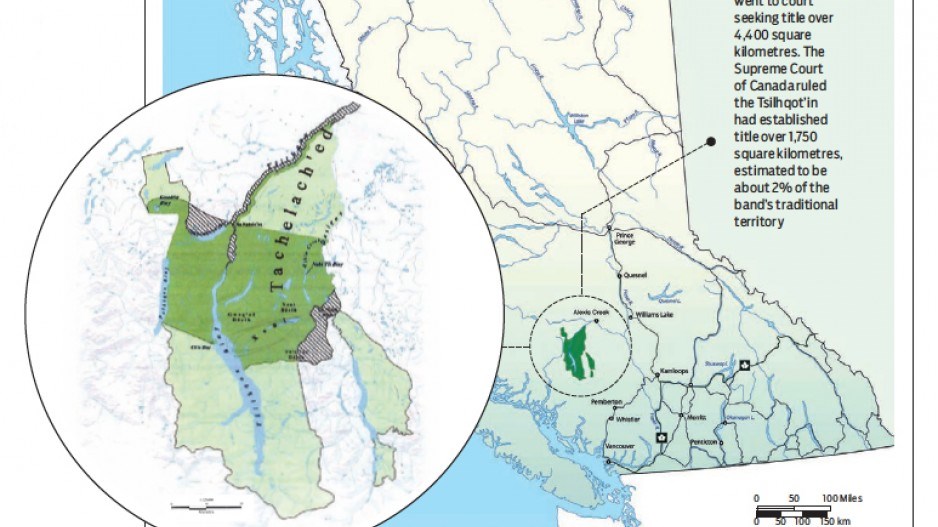A Supreme Court of Canada decision that awarded aboriginal title to the Tsilhqot'in First Nation may not necessarily stop projects like the Northern Gateway pipeline.
Even aboriginal title can be trumped by senior governments for projects like highways or pipelines deemed to be in the greater public interest.
It may not even stop the New Prosperity mine, despite assertions to the contrary by Tsilhqot'in Chief Joe Alphonse.
But the case brought by Roger William against the B.C. government will require B.C.'s Forest Act to be rewritten and could have an impact on independent power projects involving First Nations in B.C., say experts in aboriginal and treaty law.
It could also inspire First Nations that had been at the treaty table to abandon the process and try their luck with the courts, although there's no guarantee that route is any quicker or cheaper.
“I do not think the sky is falling,” said Keith Bergner, a lawyer specializing in aboriginal law with Lawson Lundell LLP.
While the decision will give guidance for future court decisions, Bergner said, “it's not a result that you immediately duplicate everywhere.”
Every case of aboriginal title will have to be decided on its own merit.
The William decision is important, however, because, for the first time in Canadian history, the highest court in the land has confirmed aboriginal title based on the definitions established in 1997 in Delgamuukw vs. British Columbia.
In the William case, the court ruled that 1,750 square kilometres of Crown land southwest of Williams Lake now belong to the Tsilhqot'in, not the Crown.
That's believed to be 2% of the Tsilhqot'in traditional territory. It includes the northern portion of Ts'yl-os Provincial Park.
It does not include Tsilhqot'in reserve land, which remains under the control of Aboriginal Affairs and Northern Development Canada.
The ownership is not fee simple but collective and comes encumbered by the need to take future generations into account.
That could create problems for businesses like independent power producers and other resource companies, said David Austin, an energy lawyer who has worked on numerous run-of-river and wind projects.
These projects are typically done on land owned by the Crown.
Power companies assume that the land is subject to First Nations land claims and they negotiate impact and benefits agreements with them accordingly.
But now that the court has said aboriginal title land is collective and to be used with future generations in mind, Austin wonders how some projects will get financed, since it provides no security to lenders.
First Nations in B.C. that are still at the treaty table may now be wondering why they should continue to rack up debt in a process that has dragged on for two decades, and opt instead to assert their title and rights through court.
In fact, within hours of the Tsilhqot'in decision coming down, the Tahltan First Nation announced plans to seek legal recognition of its aboriginal title in its traditional territory – a move aimed largely at stopping the Arctos anthracite coal project proposed by Fortune Minerals Ltd. (TSX:FT).
But going to court may be no less costly and time-consuming than a negotiated settlement, said B.C. Treaty Commissioner Sophie Pierre. And the William decision did not confer any powers of self-government on the Tsilhqot'in.
Whereas provincial laws will still apply to Tsilhqot'in title land, and federal laws will apply to their reserve lands, treaties give First Nations like the Tsawwassen the right to make their own laws on everything from land use to education.
“If they want self-determination, self-government, then treaty is the only way,” Pierre said.
Tsilhqot'in Chief Alphonse agrees the Supreme Court decision gives his people only limited control over their own land.
“What we have right now in order to have proper governance in our communities is inadequate,” he said.
Although the Tsilhqot'in have never joined the B.C. treaty process, that doesn't mean they would not welcome a treaty settlement.
Alphonse blames federal government intransigence for failing to resolve their claims through a negotiated settlement.
“This case was not about separating from Canada,” he said. “This case was about being recognized in a meaningful way within the society of Canada. We want to be a part of that society.”
See “Court decision won't settle New Prosperity dispute,” page 11; “Uncertaintly unsettling B.C.'s economy,” page 36.
Governments should redouble treaty efforts, former minister says
Former B.C. attorney general and treaty minister Geoff Plant said senior governments should use the William case to pursue treaty talks in B.C. with renewed vigor. If they don't, they may find themselves in a very bad negotiating position.
The William decision does not automatically confer aboriginal title on any other First Nation in Canada – just the Tsilhqot'in.
But Plant said other First Nations could use the William decision “to act as though your title has been proven and to make demands based on that and to use the leverage of uncertainty to extract better arrangements.”
Another Supreme Court ruling, Haida, defined the interim responsibilities of governments to consult and accommodate First Nations while the question of aboriginal title is still unresolved and being decided through the courts or treaty process.
First Nations could use the William and Haida cases to strengthen their bargaining positions, even though their rights to land remain unresolved.
“This is what some First Nations have been doing with the Haida decision for 10 years,” Plant said.
“Sometimes it works. First Nations will say, ‘We know where our title is, we don't have to prove it. You have to deal with us on that basis,' and now the stakes are higher. I think government has to be careful to do something to minimize that risk.”




